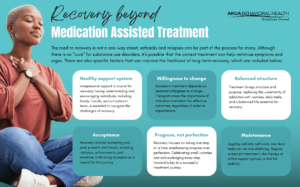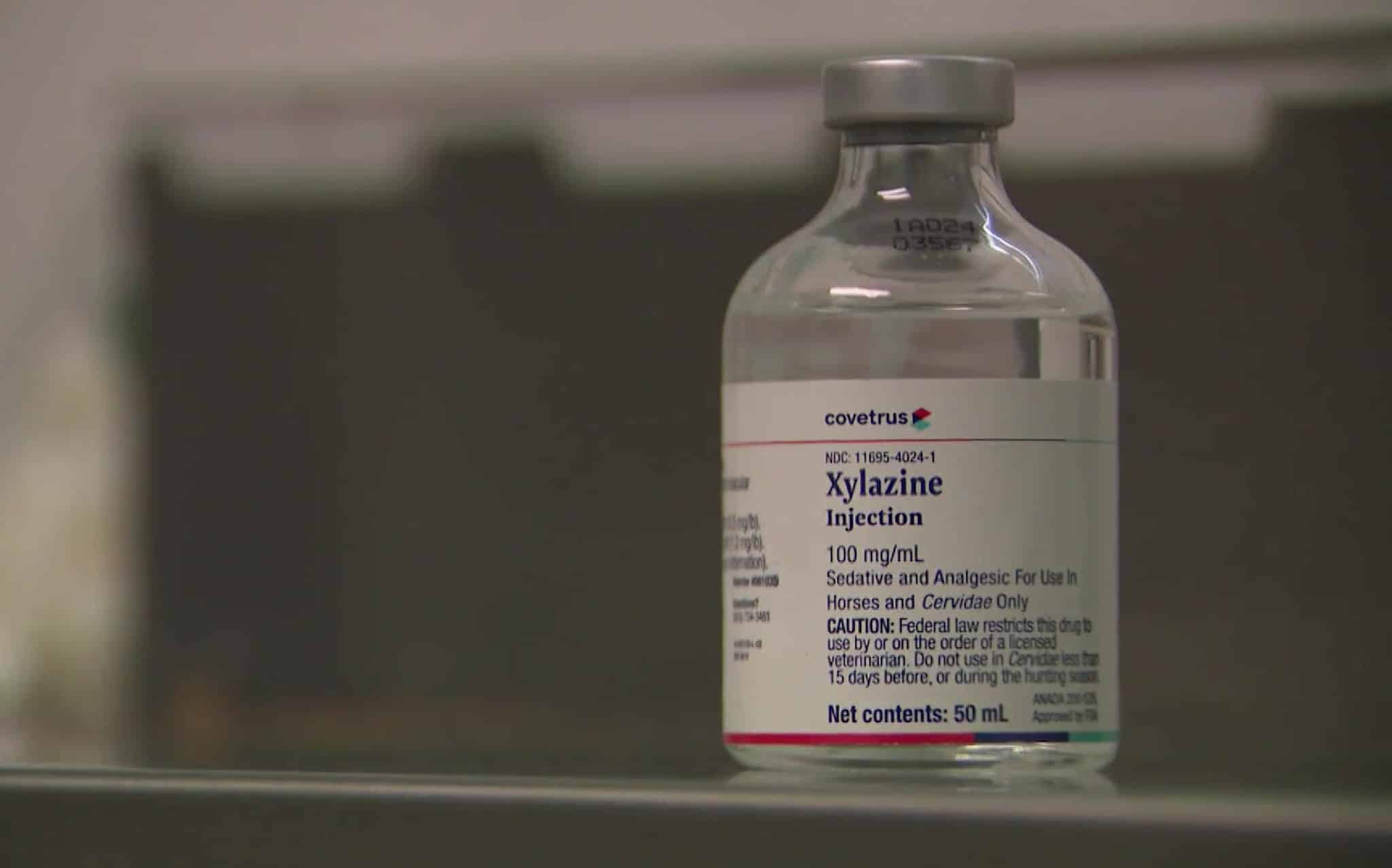Medication-assisted treatment (MAT) is the use of prescription medications in addiction treatment to alleviate withdrawal symptoms associated with dependence urges and cravings associated with addiction. Alcohol and drug withdrawal side effects can be very uncomfortable and even life-threatening. By providing relief through medications, people have a higher chance of overcoming their addiction and becoming more successful in their recovery. These prescription medications are known to reduce or block the euphoric effects of drugs, stabilize brain chemistry, relieve cravings, and normalize body functions.
Common MAT medications include the following:
- Naltrexone (Vivitrol)
- Buprenorphine
- Clonidine
- Methadone
- Acamprosate
- Disulfiram
- Suboxone (buprenorphine and naltrexone)
Comfort medications vs. MAT
By definition, MAT is used specifically for opioids, alcohol, and nicotine dependence and addiction. This is because there are specific FDA-approved medications to help alleviate symptoms of withdrawal associated with opioids, alcohol, and nicotine. With that said, it is possible to receive comfort medications to help you manage withdrawal symptoms from other substances such as cocaine and meth. Still, these medications are not specific to these drugs and instead are used to curb generalized withdrawal symptoms and, therefore, are not considered a part of MAT. For example, there is no FDA-approved prescription medication to help manage withdrawal and addiction from stimulants such as cocaine and methamphetamine. However, there are comfort medications that can help with overall non-specific withdrawal side effects. The difference between comfort medications and MAT-approved FDA prescription medication mainly concerns insurance coverage purposes.
How long will I need MAT?
Decades of evidence-based research show that properly administered MAT is a safe and effective treatment option for alcohol use disorders and substance use disorders, increasing individuals’ success in recovery. Research has also shown that individuals who adopt MAT have a lower likelihood of relapsing and a higher chance of staying in treatment longer than those who do not utilize MAT. MAT can be used in short-term and long-term addiction treatment settings. One person may benefit from MAT during their withdrawal phase from opioids, while another person may need longer maintenance therapy to help them with their cravings and urges. MAT therapy can be administered for weeks to a couple of years or longer. The exact medications prescribed and the duration of these medications depend on the person’s substance abuse history, clinical medical history, and long-term treatment goals.
MAT and residential treatment
MAT addresses both the physical and psychological aspects of addiction. The physical aspects are addressed during the withdrawal and detox process when medications are given to help alleviate unpleasant or dangerous withdrawal side effects. Withdrawal occurs when a person is dependent on drugs or alcohol, meaning that their body becomes so used to the presence of this substance that when they cut back or stop using the substance altogether, their body goes into withdrawals. Short-term MAT addresses the physical withdrawal period; however, once an individual successfully undergoes this detoxification process and is no longer experiencing withdrawals, they are often faced with the psychological impacts of their addiction. This includes underlying triggers such as past trauma, depression, or anxiety associated with their addiction, urges, and cravings. If these psychological components are not addressed safely and effectively by an addiction professional, then the person is at risk of relapse.
Residential treatment plays a pivotal role in your long-term recovery because it uses a combination of MAT (short-term and long-term) and a combination with psychotherapy, including cognitive-behavioral therapy, dialectical behavioral therapy, contingency management, motivational interviewing, and different types of trauma therapy. MAT can be administered in the “maintenance” phase of your addiction to help prevent cravings and urges, reducing your risk of relapse. Although there are “online” MAT programs, these often do not address the psychological aspects of your addiction, and as a result, you may be at an increased risk for relapse.
“Residential treatment programs typically last 30–90 days, depending on each client’s needs. In some instances, clients will take part in a shorter inpatient treatment program, such as 28-30 days, and then transition into an outpatient care program that lasts much longer. Although some inpatient programs only last 28 days, the most effective inpatient programs last 90 days or longer.” To learn more about residential treatment at AKUA, click here.
Recovery beyond MAT

The road to recovery is not a one-way street, and as hard as it may be to accept, setbacks and relapses can be part of the process for many. Although there is no “cure” for substance use disorders, it is possible that the correct treatment can help minimize symptoms and urges. There are also specific factors that can improve the likelihood of long-term recovery, which are included below:
Healthy support system:
Interpersonal support is necessary for recovery. Whether it is support from family, friends, neighbors, community members in recovery, or your treatment team, having individuals who support you and can help you is crucial to your recovery. Being in recovery can feel terrifying and isolating at times, and therefore, it is so important to be surrounded by individuals who understand you, know what you are going through, and are willing to stay by your side, cheering you on and keeping you focused when the going gets tough.
Willingness to change:
Individuals who have the desire and will to change will often be more successful in treatment than those who resist change. Many therapists believe that you must want to enter therapy to get the most out of your treatment approach. It does not matter if others want you to change. You must want to change for the better.
Balanced structure:
Living in addiction is often uncertain, unbalanced, unstructured, and unpredictable. Upon entering treatment, you will see that your life is starting to form into a daily structure. Having routines, hobbies, daily tasks, and a set structure can help you stay on the road to recovery. Keeping busy, tending to daily activities, establishing a sense of organization, taking on responsibilities, and finding a healthy balance can bring you a sense of purpose and pride, which is essential for recovery.
Acceptance:
Recovery goes hand-in-hand with acceptance. You are accepting the past, present, and future. It is essential to accept your past mistakes, accomplishments, and feelings and stay tuned to accept what comes your way in the present and future.
“God, grant me the serenity to accept the things I cannot change, the courage to change the things I can, and the wisdom to know the difference.”
Progress, not perfection:
Recovery is all about putting one foot in front of the other and working on one day at a time. As a result, the journey is about progress and not teaching perfection. Even though our society is built on “perfectionism,” it is important to adopt the concept of “progress” during treatment. Celebrate the small moments and the big victories, and be aware of every step forward you take, no matter how big or small. If we strive for perfection, we may not ever become successful in treatment, but our treatment journey will be successful if we strive for progress.
Maintenance:
Maintaining sobriety while practicing self-care and juggling everyday tasks can be overwhelming. Maintaining a self-care routine while maintaining some outpatient treatment is important. This could be seeing your therapist once a week or once a month, attending an online support group, or keeping in contact with your recovery sponsor or recovery alumni group.




